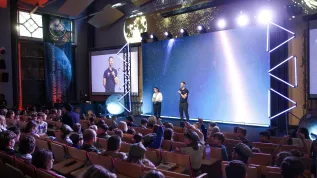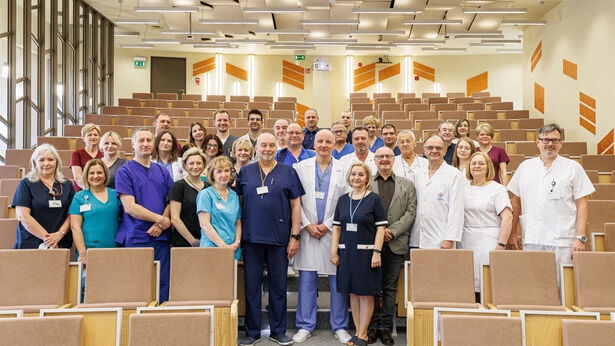New technology for eye diagnostics is being developed at the Wrocław University of Science and Technology

05/11/2025 update: 05/11/2025
2 minutes of reading
A group of scientists from Wrocław University of Science and Technology is developing a new method for functional imaging of the human retina. Their technology will be used to develop and evaluate the effectiveness of gene therapies and regenerative therapies for eye diseases, the Wrocław university announced.
A team led by Dr. Jakub Bogusławski from the Faculty of Electronics, Photonics and Microsystems at the Wrocław University of Science and Technology is working on new solutions to improve the diagnosis of eye diseases.
The project of Wrocław scientists entitled "Two-photon fluorescence lifetime ophthalmoscopy: new perspectives in the diagnosis of eye diseases" received PLN 4 million in funding from the First Team FENG FNP program, Michał Ciepielski from the Wrocław University of Science and Technology press office told PAP on Tuesday.
Dr. Bogusławski explained that two-photon fluorescence lifetime ophthalmoscopy is an advanced technique that allows for the observation of biochemical processes occurring in photoreceptor cells with high precision, without the need for sampling or tissue intervention. "This will enable the study of visual function in a completely non-invasive manner," the scientist emphasized.
Experts from Wrocław University of Science and Technology emphasize that precisely measuring fluorescence decay times in the human eye remains a technical challenge. To address this challenge, work is underway on new solutions in optics, electronics, and photonics, including femtosecond lasers and efficient systems for detecting and counting single photons, the Wrocław university emphasized in a press release.
– It is thanks to these innovations that, together with our colleagues, we will be the first in the world to apply this technology to the diagnosis of eye diseases in humans – added Dr. Bogusławski.
As emphasized, the project will be carried out at the Ultrafast Biophotonics Team, in cooperation with the International Eye Research Center in Warsaw, the University Clinical Hospital in Jena (Universitätsklinikum Jena) and InCellVu SA.
As a result, a new diagnostic tool will be created that will be used in the development and evaluation of the effectiveness of gene therapies and regenerative therapies for eye diseases.
"In the long term, our technology could contribute to the development of new therapies that will restore vision or prevent its loss. The photonic solutions we are developing represent an important step towards the development of diagnostic methods and therapies that protect visual function," added Dr. Bogusławski. (PAP)
Science in Poland
pdo/ zan/
The PAP Foundation permits free reprinting of articles from the Nauka w Polsce website, provided that you notify us by email once a month of your use of the website and cite the source of the article. On portals and websites, please include the linked address: Source: naukawpolsce.pl, and in journals, please include the annotation: Source: Nauka w Polsce website - naukawpolsce.pl. This permission does not apply to information in the "World" category or any photographs or video materials.
Before adding a comment, please read the Forum Rules of the Nauka w Polsce website.
Dear Reader, In accordance with the Regulation (EU) of the European Parliament and of the Council of 27 April 2016 on the protection of natural persons with regard to the processing of personal data and on the free movement of such data, and repealing Directive 95/46/EC (General Data Protection Regulation), we hereby inform you about the processing of your data. The data controller is the PAP Foundation, with its registered office in Warsaw at ul. Bracka 6/8, 00-502 Warsaw. This data is collected as part of your use of our services, including websites, services, and other functionalities provided by the PAP Foundation, primarily stored in cookies and other online identifiers installed on our websites by us and our trusted partners of the PAP Foundation. The collected data is used solely for the following purposes: • providing services electronically • detecting abuses in services
• statistical measurements and service improvement
The legal basis for data processing is the provision and improvement of the service, as well as ensuring security, which constitutes the legitimate interest of the controller. At the request of the controller, data may be shared with entities authorized to obtain data under applicable law. The data subject has the right to access, rectify, and erase the data, and to restrict its processing. The data subject may also withdraw consent to the processing of personal data.
Please send all notifications regarding personal data protection to [email protected] or in writing to the PAP Foundation, ul. Bracka 6/8, 00-502 Warsaw, with the note "personal data protection"
More information about the processing of personal data and your rights can be found in the Privacy Policy. Learn more. I consent
naukawpolsce.pl







